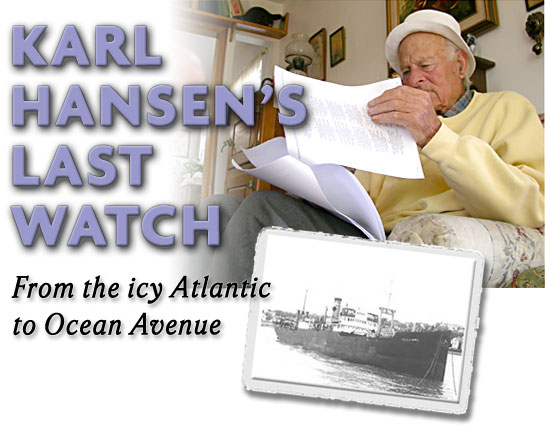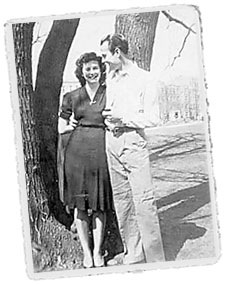|
COVER
STORY | IN THE NEWS | PUBLISHER | READER'S
REQUEST October 20, 2005
Above, Karl Hansen looks over
a copy of his poem. Photo by Helen Sanderson 1.
2.
3.
4.
TO HEAR KARL HANSEN RECITE HIS EPIC poem, "The Hallfried's Last Watch,"is a pleasure. His accent --- a blend of British, Scottish and Norwegian influences gives the words a certain amount of sophistication, and he presents them with panache. Stretching vowels for a sing-songy effect and deepening his voice in certain lines, life is breathed into the words, creating an ominous chill in one stanza, a soft lullaby in the next. But the most impressive and intriguing thing about the 83-year-old's ability to recite the 2,100-word epic is that his memory, for the most part, is collapsing. Hansen has Alzheimer's Disease. He can't remember, for instance, what he ate for lunch or how he wound up in Humboldt County 15 to 20 years ago. But the poem, "The Last Watch," serves as a sort of an anchor to which his very identity clings. He will sometimes launch into the poem when he's presented with a question about his past that he can't recall, recounting the adventures and the trauma he experienced as a sailor in World War II through the exquisitely crafted rhyme. "Memory is a marvelous thing," said Hansen one recent afternoon. "Ultimately, something will jog your memory. I must write. It is essential to my well-being." At which point, Hansen's memory was jogged again. "She was not very handsome... " he began. The man himself is more than just a poem, but who is Karl Hansen? That's what one Eureka family has been trying to find out for the past nine months. Ocean AvenueAfter years adrift in Humboldt County it's an interesting coincidence --- or you could say it's fate that Hansen would wind up spending the twilight of his life on Eureka's Ocean Avenue. After all, the man gave his youth to the ocean, and nearly lost himself in its depths. It was last Christmas when Hansen walked alone down Ocean Avenue. Along the way, he was greeted by Coley Taylor, who was in his small front yard visiting with guests and relatives. There were about 25 people there that day, evenly mixed between family and friends who had no family. So it wasn't out of the ordinary when Francine Taylor, Coley's wife and a stay-at-home mother of three, found that her husband had invited a dapper-looking elderly man to have a plate of food. But as quickly as he came, he was gone. Hansen fainted at the table and was brought to the hospital in an ambulance. Before he left, the old man couldn't manage to tell the Taylors where he lived. "We didn't want to lose contact with him," Francine said. "I kept calling the hospital and basically begged them to tell me where he went." When Francine learned that Hansen was sent in a cab back to the Serenity Inn, a homeless shelter in Eureka, she "just about cried." "I thought, this man deserves better than that," she said. From there, Francine and Coley visited Hansen over the next couple of weeks, either bringing him to their house for supper or dropping off meals at his place. He was living in a motel room with three young men, one of whom Coley suspected was using drugs. "We tried not to be judgmental of his situation," Francine said, "but the day finally came that I had to ask him, 'Karl do you like living here?'" The answer was a definitive no. Hansen confided that the men treated him badly and stole from him. He hated it there, he told her. Soon thereafter, Hansen was living with the Taylors. Since his arrival, he's become a sort of resident grandfather to the family. But living with a mysterious man with Alzheimer's has presented challenges. Some of those issues are small like constantly reminding Hansen to put on pajamas and get under the covers when he goes to bed. Others are far more complex, like setting up a bank account for a man without a Social Security number, or retrieving a war pension that should have been accounted for in the 1940s. "He isn't the kind of person to ask for anything, not even for breakfast or a cup of coffee; he just won't impose himself at all," Francine said. "He doesn't understand how to use the system to his advantage." It might seem weird that the Taylors, with three young children in their house, would willingly invite a man to live with them, someone whom they knew little about and who knew little about himself. "From the first day I met Karl I knew he was a kind, gentle person and that initial impression has never changed," Francine said. "We took time to get to know him first and believe me, I am a freak when it comes to my kids' safety. I watch everyone like a hawk." She even keeps binoculars near the window to keep an eye on things in her neighborhood. It wasn't long after the Taylors took Hansen from the Serenity Inn that they were on the receiving end of a different type of scrutiny. The cops came looking for Hansen, and informed Francine that the man had been placed at the Serenity Inn by Adult Protective Services. That year someone called the authorities because they believed Hansen was no longer capable of caring for himself. Social Services stepped in and took Hansen from his apartment in Loleta, where he'd lived for a number of years, and placed him at the shelter. Social Services let Hansen stay with the Taylors, happily so. "[The social worker] and I were hugging and crying and she was saying, 'You don't know how long we've worried about this man. We're so glad he's with good people,'" Francine recalled. Friends of Karl8.
9.
10.
11.
From talking with social workers and the doctors at the Mobile Medical Office where Hansen receives his health care, Francine was able to start piecing together bits of the man's life. For one, she found out that
Karl Hansen was not his real name --- it's Thomas Shaw, and he
was born in 1922 in Jarrow-on-Tyne, a port town in northeast
England. Why he goes by Karl is not completely clear, but his disdain for his home country could be part of the reason, Francine guesses. The British government offered his father no compensation after he was gassed and crippled in World War I. With a severe limp and unable to find work to support his family, his father would beg disembarking travelers at the train station to allow him to carry their luggage. It's something Hansen hasn't forgotten. Right: Thomas Shaw and wife, 1946. The couple later divorced. Shortly after he began sailing with the British, Hansen switched to Norwegian ships and essentially assumed a Norwegian identity. The name "Karl Hansen" is very common, it's like America's "John Smith." "We call him Karl because that's what he likes best," Francine said. "But in all of his documents he's known as Thomas Patrick Shaw." Documentation is another hard thing to come by with Hansen. He has no Social Security number, and hardly any record of living in the United States at all. Before he came to Humboldt County he lived in Arizona. Beyond that there's no telling, and Hansen cannot remember. Even before Francine came into Hansen's life, a number of people attempted to help the man. Among them was Steve Dunn, a former Eureka Police Officer who is now with the Humboldt State University Police. Dunn found Hansen one night, clearly lost and saying he was looking for the road to Norway. The officer later enlisted the help of a U.S. Marshall, John Mohon, who used the Internet to find clues to Hansen's past. On a message board for Norwegian war sailors, Mohon posted this message in August 2004:
From there information started to pour forward. In fact, Mohon wasn't the first person to look for help for Hansen on the site. The first guest book message relating to him dates back to October 2003. A man named Craig Mesman wrote:
Back to Norway23.
24.
25.
26.
The website that has served as a hub for information about Hansen, www.warsailors.com, is maintained by Oklahoma resident Siri Lawson. She launched the site after her daughter asked what her grandfather, Lawson's father, did as a Merchant Marine during World War II. "It was then that I realized just how little I knew about my dad's experiences," she said in a telephone conversation from her home north of Tulsa, where her husband works for an oil company. Maintaining the site, she says, is a massive task, but she considers it the most important thing she has accomplished in her life, aside from raising her children. "A lot of these men were treated very badly after the war because many people, out of ignorance, did not consider Merchant Marines to be true soldiers," she said. "This gives them a little of the respect they deserve." The Norwegian Merchant Marines had a fleet of 1,000 ships in World War II; 500 of them were sunk, and 4,000 sailors were killed. Hansen's poem is now posted on a page dedicated to the Hallfried on Lawson's site. Since that time, Norwegian sailors have contacted her about it. A Norwegian seaman's association was so moved by Hansen's poem that its members have offered to help him in any way possible to recover a war pension from the Norwegian government. Now, Lawson serves as a go-between for Francine and the Norwegians, and the women have grown to be friends. Even Lawson and Hansen talk on the phone, in Norwegian, every so often. Just last week the man who is spearheading the effort on Hansen's behalf told Francine chances are very good that Hansen will be awarded medals and a pension for his time as a Norwegian Merchant Marine. Sundown29.
30.
31.
32.
33.
These days, Hansen spends most of his time reading in his bedroom and walking. He treks around Eureka for four to five hours a day. Paula Rhude, a nurse with the Mobile Medical Office, where Hansen has received most of his health care for the past two years, sees him on her route around town. "He's quite the walker," she said. "I like to see people out walking --- it's good for you. But I worry about Karl. Sometimes he can't find his way home."
Left: Francine Taylor and Karl Hansen. "I think he is a very good man, and certainly someone that makes you want to help him as much as you can," Rhude said. "I was alarmed when we first realized that he was at the mercy of strangers." Before Hansen's memory recedes much further, Francine Taylor wants to reunite the man with his son, who was located in Canada by Marshall John Mohon and the war sailors' website. The two men have not seen each other in more than 50 years. They've spoken on the phone a few times recently, and Francine shows Hansen pictures of his son every week to keep the memory of him as vivid as possible. In the meantime, she hopes that the pension from the Norwegian government will come through so Hansen will have something to rely on if the time comes that he has to go to a nursing home. It's obviously a painful prospect for her to consider. "I can't imagine what it will be like for him if he's locked down," Francine said. "This is a man who's traveled the world. He loves to walk and talk with people. His freedom means everything." 37.
38.
39.
40.
41.
COVER
STORY | IN THE NEWS | PUBLISHER | READER'S
REQUEST Comments? Write a letter! © Copyright 2005, North Coast Journal, Inc. |


